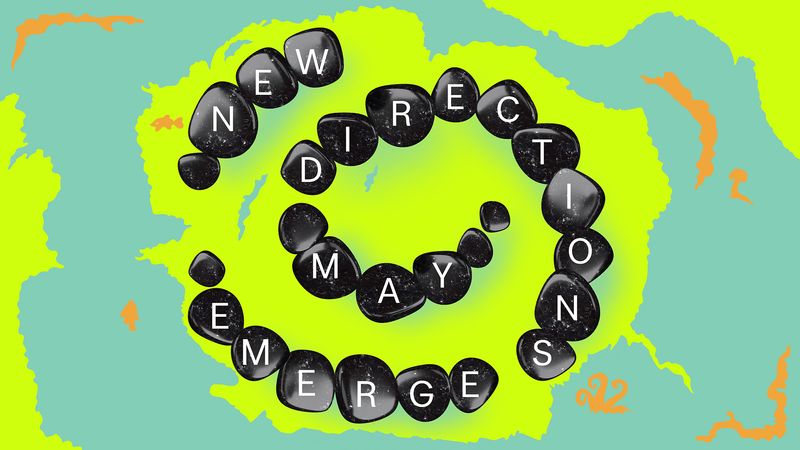
New Directions May Emerge
co-curator of Helsinki Biennial 2023
- HB ~ New Directions May Emerge
- Agonistic Intelligence/s (or another AI/s)
- Agonistic Intelligence/s Public Lecture I - Deschooling Art and its Archives
- Agonistic Intelligence/s Public Lecture II - Who Are Museums For? On Goers and Absentees
- Agonistic Intelligence/s Public Lecture III - The Politics of Access within Archiving as Artistic Praxis
In 2022, I was invited to be a part of the co-curatorial team of the Helsinki Biennali, 2023 by its head curator Joasia Krysia.
This team, dubbed Co-curatorial Intelligences by Joasia, comprised Ali Akbar Mehta and Giovanna Esposito Youssif from Museum of Impossible Forms (MIF), Markus Reymann from TBA21–Academy, Jussi Parikka, May Ee Wong and Paolo Patelli from Critical Environmental Data, Bassam El Baroni and Patrizia Constantin from ViCCA @ Aalto ARTS – Visual Cultures, Curating and Contemporary Art (ViCCA), and AI Entity created by artist Yehwan Song and the Digital Visual Studies project.
As part of the Museum of Impossible Forms (MIF) curatorial collaboration, we developed the artist list for the Helsinki Biennali, with special emphasis on artists in Finland who despite a strong practice remain otherwise ignored within the institutional frameworks of Finnish Art and Culture. Through summer 22 to the spring 23, we worked with curatorial team and the artists to facilitate existing and new comissions for the Biennali located on the island of Vallisaari, Helsinki Art Museum (HAM), public locations across the city and the city cultural centers (STOA and Caisa).
Apart from this contribution to the Biennali, Museum of Impossible Forms developed two trajectories of enquiry for the Biennale, a public facing series of events titled Polyphonic Entanglements (curated by Giovanna Esposito Youssif) and an institution facing Summer School titled Agonsitic Intelligence/s (or another AI/s) (curated by Ali Akbar Mehta).
Agonistic Intelligence/s (or another AI/s)
Summer School curated by Ali Akbar Mehta for the Helsinki Biennial 2023: New Directions May Emerge
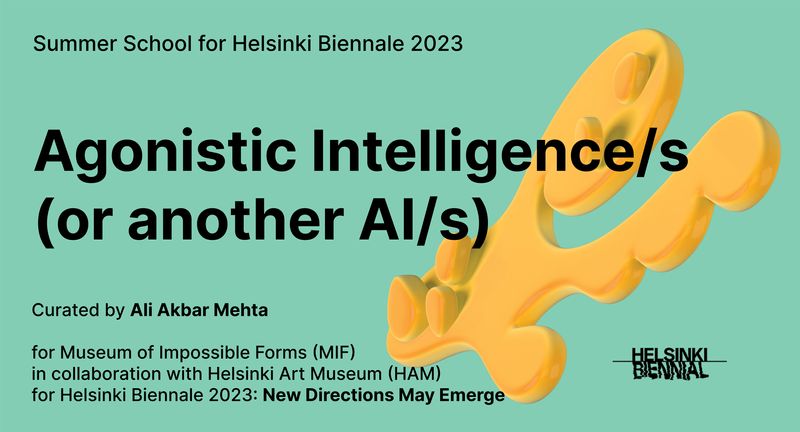
Agonistic Intelligence/s (or another AI/s) is a gathering of invited provocateurs, guest speakers, and participants to form a research-led working group that engages with a shortlisted selection of the HAM art collection as a key focal node and as an archival site of inquiry. The working group will convene for an intensive 6-day period during the Helsinki Biennale 2023, from August 14-19, 2023, at HAM Salli, Helsinki Art Museum, with open-to-public evening lectures and discussion programs.
A play on the words AI (Artificial intelligence), Agonistic Intelligence/s as a title borrows the word ‘Agonistic’ from Chantal Mouffe’s conception of Agonistic Democracy that outlines a necessarily conflictual nature of pluralism – one that stems from the impossibility of reconciling all points of view – as being not only an inevitable aspect of public action and collective identities but one that cites confrontation as a positive and integral method for challenging consensus-driven politics. Dissensus, as a longing for instability, counters the ossification and cementing of values, opening the possibilities for continually evolving decolonial, queer-feminist and norm-critical readings of the archive, where narratives may be formulated to describe realities otherwise made invisible. Encapsulated in the formulation of the title of being another kind of an AI – one premised on exclusion – a key question is raised: Whose intelligence is deemed artificial?
Agonistic Intelligence/s operates from a conceptualisation that archives investigate contaminated circumstances. Invited speakers, provocateurs and participants respond to the Helsinki Biennale 2023’s curatorial framing of contamination, agency, and regeneration organized around complementary research threads, including: ‘Technodiversity’, ‘Datafeminisem’, ‘Politics of Exclusion within the Archives’, ‘Affective Agencies and contamination’, ‘BIPOC community building as activist technologies’, and ‘decolonization within institutions. The gathering will remember and formulate technologies, methodologies and praxes that centre the building of anticolonial, antipatriarchal, anticaste, and antifascist practices and futures.
Such encounters open up spaces for dialogue in the summer school, enabling the working group to formulate a series of questions that must be asked of a collection and what a collection and, by extension, its host institutions must be accountable for – what is archived, who is collected, what can the museum teach us beyond what it shows us? how may a collection be viewed beyond the dialectics of inclusion and exclusion, beyond its designation as a status symbol? How can the active participation of communities and public(s) that often remain beyond the gaze of the institution help to reactivate, rejuvenate, and reconfigure culture, for all?
And so, Agonistic Intelligence/s invites its participants to perform a critical diagnosis, to generate insights into how to read the collection differently and reconfigure new relationships with the collection located within the museum, across the city, online, and elsewhere. They are also invited to form a long-term working relationship to access within each other a wealth of diverse, embodied, situated knowledges/ non-knowlegdes, that often resides outside the purview and domains of traditional museum working conditions and interests.
More information about the Summer School and links for particpation may be found here
Agonistic Intelligence/s Public Lecture I - Deschooling Art and its Archives
for 'Agonistic Intelligence/s' summer school curated by Ali Akbar Mehta for Helsinki Biennial 2023: New Directions May Emerge
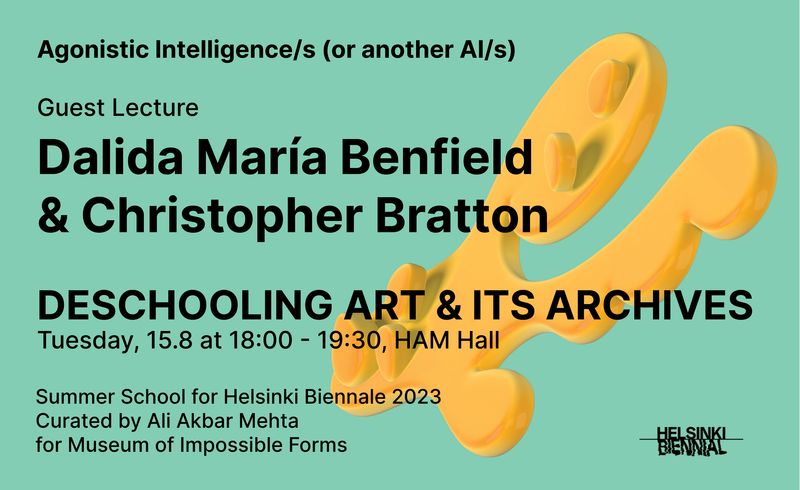
Agonistic Intelligence/s (or another AI/s) is a gathering of invited provocateurs, guest speakers, and participants that convenes as a Summer School for the Helsinki Biennial 2023. This research-led working group engages with a shortlisted selection of the HAM art collection as a key focal node and as an ‘archival site of inquiry’.
To help us unpack the multiple overlapping thematics of the Biennial NEW DIRECTIONS MAY EMERGE and the Summer School, guest speakers are invited to engage with the working group and conduct open-to-public lectures.
Please join us to welcome Dalida María Benfield and Christopher Bratton
Dalida María Benfield and Christopher Bratton: Deschooling Art and its Archives
Tuesday 15.8.2023
HAM hall, HAM Helsinki Art Museum. Eteläinen rautatiekatu 8.
Doors open: 17:45
Lecture and Q&A: 18:00 to 19:30
Link to Online Lecture here
Where, how, and when does “Art” happen? Who makes “Art”? Further, what are the frameworks through which we might formulate answers to these questions? How do we know what we know about “Art”? What are the schools, and the archives, that inform us? To discuss these questions, we use the radical concept of “deschooling” proposed by Ivan Illich in his book Deschooling Society, which makes a powerful argument for forms of learning outside of compulsory schooling. We will share international case studies of arts research and education practices outside of formal schools, including the work of the Center for Arts, Design, and Social Research. These produce relationships and projects that highlight the limits of how “Art” is normatively understood. We will also discuss how this work produces archives (or not), and what, then, might these deschooled archival practices teach us about “Art” museums and other institutional archives.
*
Dalida María Benfield & Christopher Bratton are artists and researchers who divide their time between Helsinki and Boston. In 2017, they co-founded the Center for Arts, Design, and Social Research (CAD+SR), a polycentric laboratory for research and practice focused on emancipatory and decolonial pedagogies. In collaboration with partners in Brazil, Colombia, Denmark, Finland, Italy, Kenya, Mexico, South Africa, and the UK, and the Senior Researchers and Research Fellows of CAD+SR, they organize international and intercultural research fellowships, projects, residencies, workshops, exhibitions, and publications. Most recently, they co-organized Technologies of Critical Conscientization (Con/Crit/Tec) at the Casa do Povo, São Paulo, Brazil and were the Special Guest Editors of Urgent Pedagogies, Issue #5: Pluriversality, IASPIS, Stockholm. Their collective writing on CAD+SR appears in the books Art as Social Practice: Technologies for Change, Routledge (2022), Sensing Earth, Valiz (2023) and The Routledge Companion to Decolonizing Art, Crafts, and Visual Culture Education (2023). They are co-editors, with Lucrezia Cipitelli and Luigi Coppola, of Ex-Situ – Compatible with Life – Plants for a world waiting to germinate, Kunstverein Milano (2023).
*
Agonistic Intelligence/s (or another AI/s) is curated by Ali Akbar Mehta for the Museum of Impossible Forms (MIF) in partnership with Helsinki Art Museum (HAM) for Helsinki Biennial 2023: New Directions May Emerge.
Agonistic Intelligence/s Public Lecture II - Who Are Museums For? On Goers and Absentees
for 'Agonistic Intelligence/s' summer school curated by Ali Akbar Mehta for Helsinki Biennial 2023: New Directions May Emerge
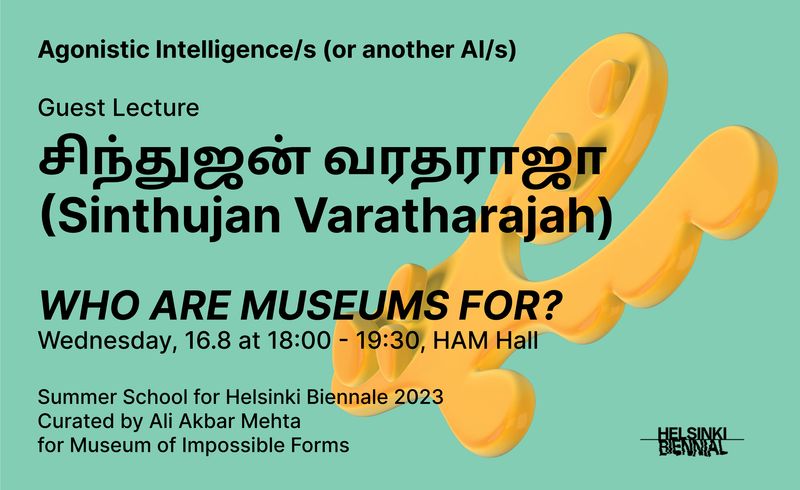
Agonistic Intelligence/s (or another AI/s) is a gathering of invited provocateurs, guest speakers, and participants that convenes as a Summer School for the Helsinki Biennial 2023. This research-led working group engages with a shortlisted selection of the HAM art collection as a key focal node and as an ‘archival site of inquiry’.
To help us unpack the multiple overlapping thematics of the Biennial NEW DIRECTIONS MAY EMERGE and the Summer School, guest speakers are invited to engage with the working group and conduct open-to-public lectures.
Please join us to welcome சிந்துஜன் வரதராஜா (Sinthujan Varatharajah)
சிந்துஜன் வரதராஜா (Sinthujan Varatharajah): Who Are Museums For? On Goers and Absentees
Wednesday 16.8.2023
HAM hall, HAM Helsinki Art Museum. Eteläinen rautatiekatu 8.
Doors open: 17:45
Lecture and Q&A: 18:00 to 19:30
Link to online lecture here
museums across europe are invested in ‘diversifying’ the demographics of their visitors by employing a variety of crowd-chasing strategies. can the museum be mainstreamed though, so much that it’s open and attractive to all? and should it be?
*
சிந்துஜன் வரதராஜா (Sinthujan Varatharajah) is an independent researcher and essayist based in Berlin. The focus of their work is statelessness, mobility and geographies of power with a special focus on infrastructure, logistics and architecture. In 2020 Varatharajah participated in the 11th Berlin Biennale for Contemporary Art with the exhibition “how to move an arche”. They are the co-curator of the Berlin-based multimedia event series “dissolving territories: cultural geographies of a new eelam” and a former Open City Fellow of the Open Society Foundations. வரதராஜா first book, “an alle orte, die hinter uns liegen”, will be published this fall by Hanser Verlag in Germany, Switzerland and Austria.
*
Agonistic Intelligence/s (or another AI/s) is curated by Ali Akbar Mehta for the Museum of Impossible Forms (MIF) in partnership with Helsinki Art Museum (HAM) for Helsinki Biennial 2023: New Directions May Emerge.
Agonistic Intelligence/s Public Lecture III - The Politics of Access within Archiving as Artistic Praxis
for 'Agonistic Intelligence/s' summer school curated by Ali Akbar Mehta for Helsinki Biennial 2023: New Directions May Emerge
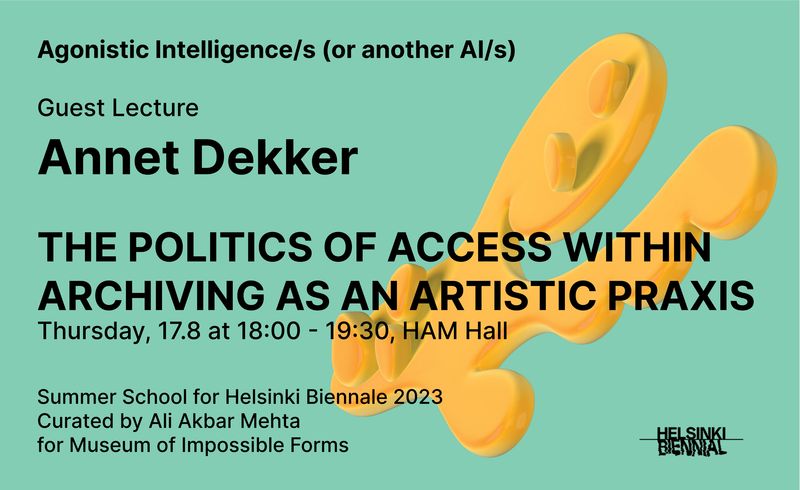
Agonistic Intelligence/s (or another AI/s) is a gathering of invited provocateurs, guest speakers, and participants that convenes as a Summer School for the Helsinki Biennial 2023. This research-led working group engages with a shortlisted selection of the HAM art collection as a key focal node and as an ‘archival site of inquiry’.
To help us unpack the multiple overlapping thematics of the Biennial NEW DIRECTIONS MAY EMERGE and the Summer School, guest speakers are invited to engage with the working group and conduct open-to-public lectures.
Please join us to welcome Annet Dekker
Annet Dekker: The Politics of Access within Archiving as Artistic Praxis
Thursday 17.8.2023
HAM hall, HAM Helsinki Art Museum. Eteläinen rautatiekatu 8.
Doors open: 17:45
Lecture and Q&A: 18:00 to 19:30
Link to online lecture here
How does an archive live up to its own values and aims in regard to collecting and collection management, especially in relation to access? The digitization of archives and the massive use of the Internet have potentially increased access to the archive and its contents, as well as facilitated the usage of information in the archive.
However, creating access doesn’t necessarily mean that records become accessible. The tension between access and accessibility will be addressed by taking up three challenges that archival organisations are confronted with, but which often remain implicit: (1) standardization as a pre-condition for understandable exchange of information; (2) contextualization as a way to make sense of data; (3) collaboration as a means to involve users.
Rather than focusing on the challenges within archival institutions, and in an attempt to appreciate the tension, in her presentation Annet Decker will focus on archival alternatives that may lead to surprising or new insights when considering what it means to provide access.
*
Annet Dekker is an independent researcher and curator. She is Assistant Professor Archival Science at the University of Amsterdam and Visiting Lecturer at London South Bank University. Previously she was Researcher Digital Preservation at Tate, London, tutor at Piet Zwart Institute, Rotterdam, and Fellow at The New Institute, Rotterdam. She initiated aaaan.net with Annette Wolfsberger in 2009; they coordinate artists-in-residences and set up strategic and sustainable collaborations with national and international arts organisations. Previously she worked as Web curator for SKOR (Foundation for Art and Public Domain, 2010–12), was programme manager at Virtueel Platform (2008–10), and head of exhibitions, education and artists-in-residence at the Netherlands Media Art Institute (1999–2008). Together with Annette Wolfsberger, she produced Funware, an international touring exhibition in 2010 and 2011 about fun in software (curated by Olga Goriunova). In 2014, she completed her PhD under the supervision of Matthew Fuller on the conservation of net art at Goldsmiths University of London, Enabling the Future, or How to Survive FOREVER. A study of networks, processes and ambiguity in net art and the need for an expanded practice of conservation.
*
Agonistic Intelligence/s (or another AI/s) is curated by Ali Akbar Mehta for the Museum of Impossible Forms (MIF) in partnership with Helsinki Art Museum (HAM) for Helsinki Biennial 2023: New Directions May Emerge.